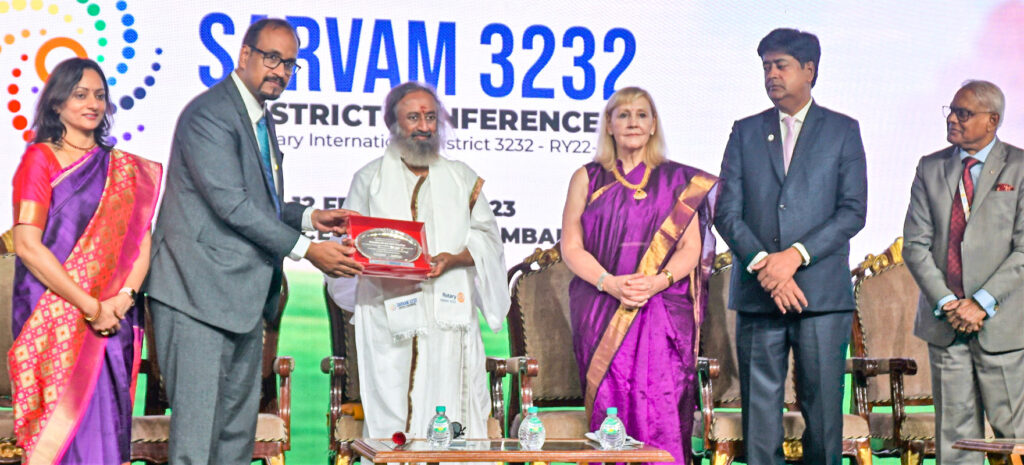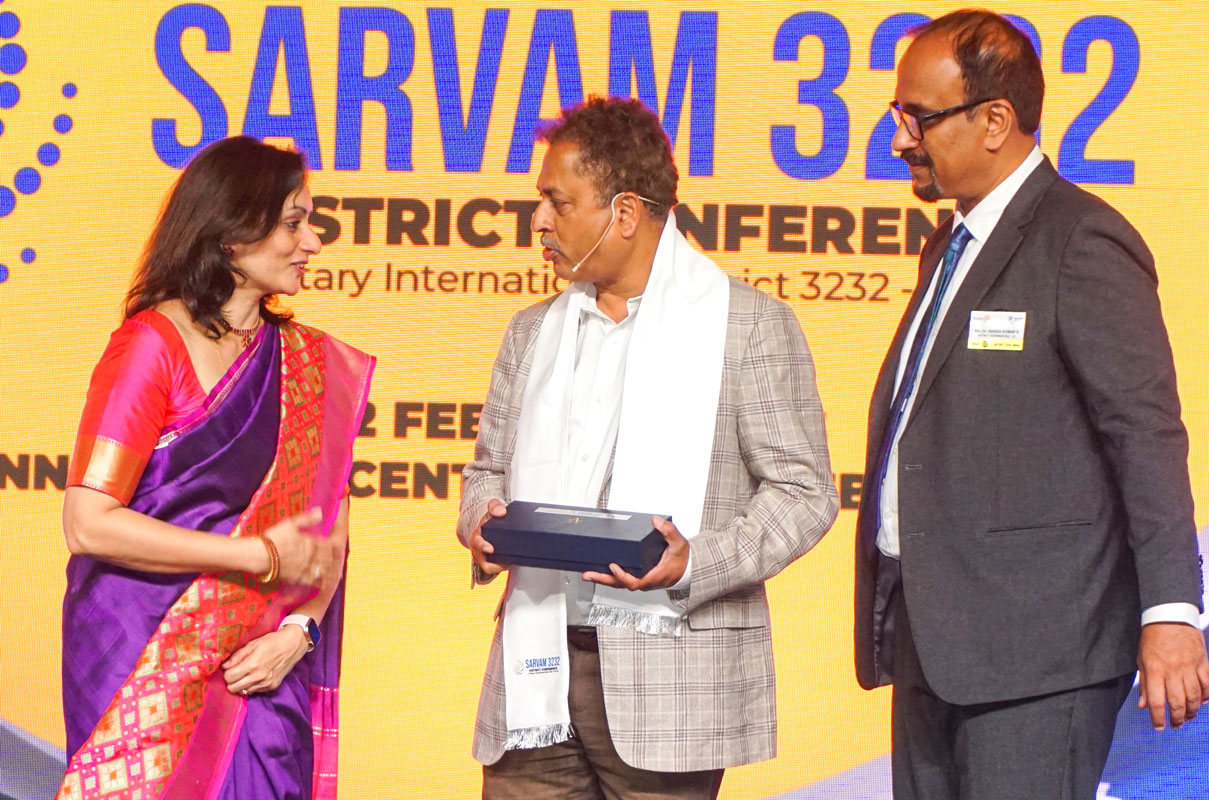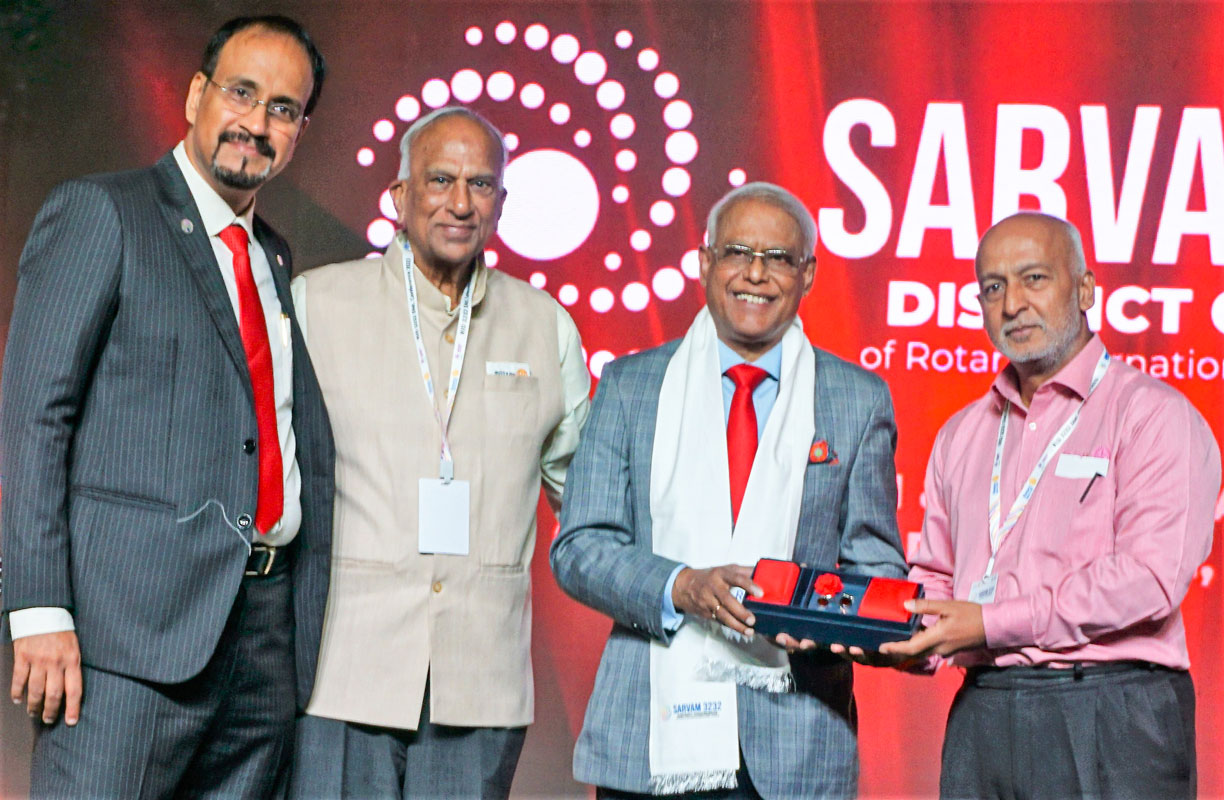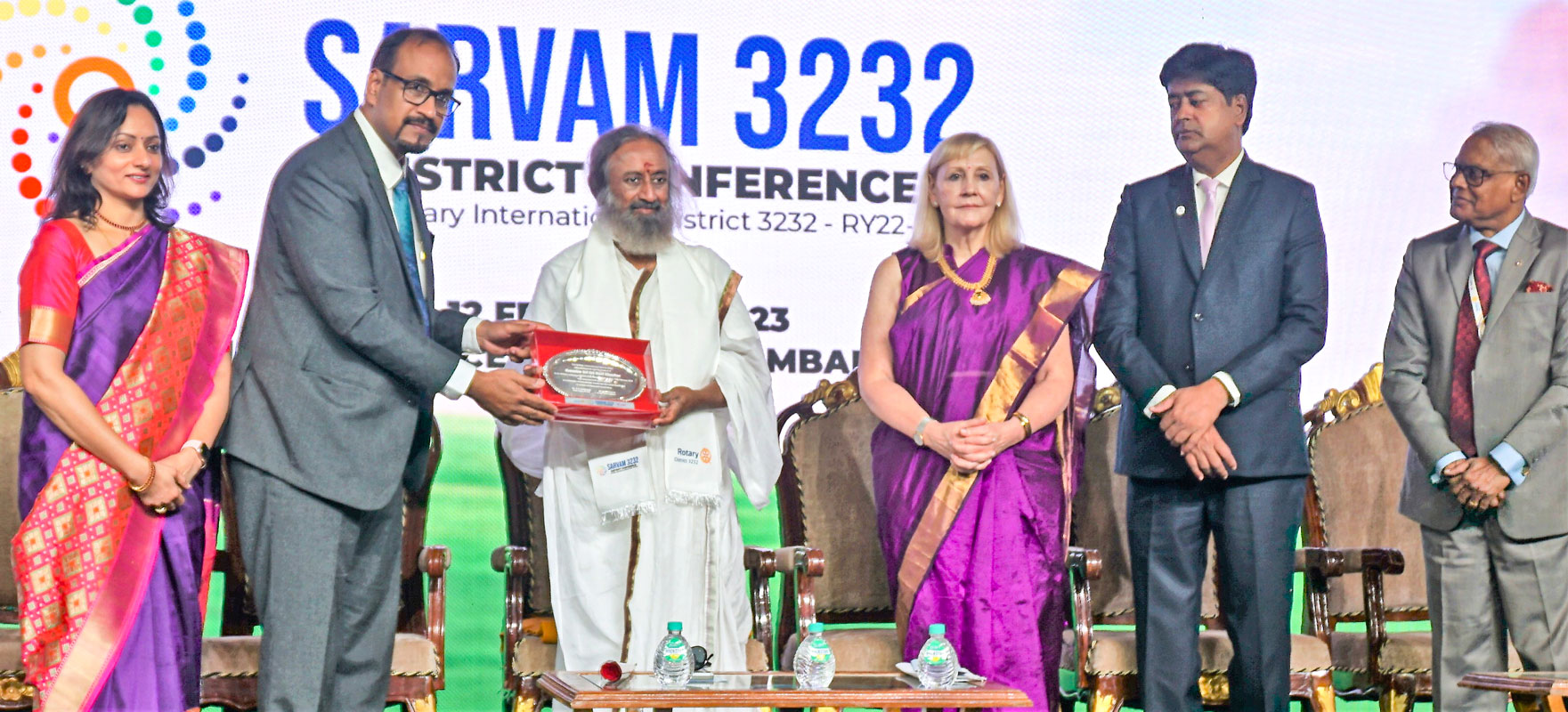
Have you connected your friends and relatives to Rotary, and more importantly, do you connect with your club members and other Rotarians across districts, asked RI director Elizabeth Usovicz, and chairperson of RI Board’s executive committee, addressing RID 3232’s discon Sarvam.
The future of Rotary is linked to DEI (diversity, equity and inclusivity), service above self, fellowship and integrity. “We need to build deep relationships among ourselves and with the public as part of branding and creating public image,” she said.
The conference included a Rotary Project Fair with 130 stalls to facilitate partnerships between the government, NGOs, corporates and Rotary clubs across the seven focus areas of action, Elizabeth said. “I will carry my experience at the inauguration of the project fair to North America and spread the message of sustainability and wellness across the clubs in my country,” she added.
Usovicz said this was her first visit to India, and “for the first time I am wearing a saree, the symbol of Indian welcome and hospitality,” she said, complimenting the 7,000-plus Rotarians across 174 clubs in RID 3232 for “being strong, vibrant and having many women as AGs and club presidents.”
We need to build deep relationships among ourselves and with the public as part of branding and creating public image.
— Elizabeth Usovicz, RI director
In his speech on membership growth, RI director Mahesh Kotbagi said, “we are 1.4 million people of action, including 200,000 Rotaractors, in more than 46,000 clubs working together to make positive change in the world.” Rotaract was elevated as a member of RI, and one must appreciate the unique experience it provides, and the value it adds to the lives of young leaders, he said.
Quoting RI President Jennifer Jones, he said that the comfort and care of “our members is the greatest driver of member satisfaction and our most powerful tool to keep members engaged in their clubs. There is so much each of us can do to help create club experiences that are welcoming, inclusive, and enjoyable.” The five priority areas of action — “membership experience, the DEI principle, expanding reach, participants’ engagement and offering new experiences by chartering new format and cause-based clubs that are flexible to suit everyone are the way forward.”
Next big corporate project
Addressing the meet, RIDE Anirudha Roychowdhury said, “over the last three decades we have identified a set of new challenges and priorities based on which RI leadership came out with a bold vision statement: Together, we see a world where people unite and take action to create lasting change, along with a strategic action plan to arrest declining membership and make the clubs adapt to be relevant to changing times.”
While RI’s quest to eradicate polio was well documented, “we have to identify the next big corporate project that will attract new members in Western countries which are facing a steep decline in numbers as they have done away with polio in 1994. They now need a big global programme to stay relevant.” Also, membership is extremely important. “To sustain membership, we are trying with new format clubs, corporate, cause-based and e-clubs to attract young, diverse members,” he added.
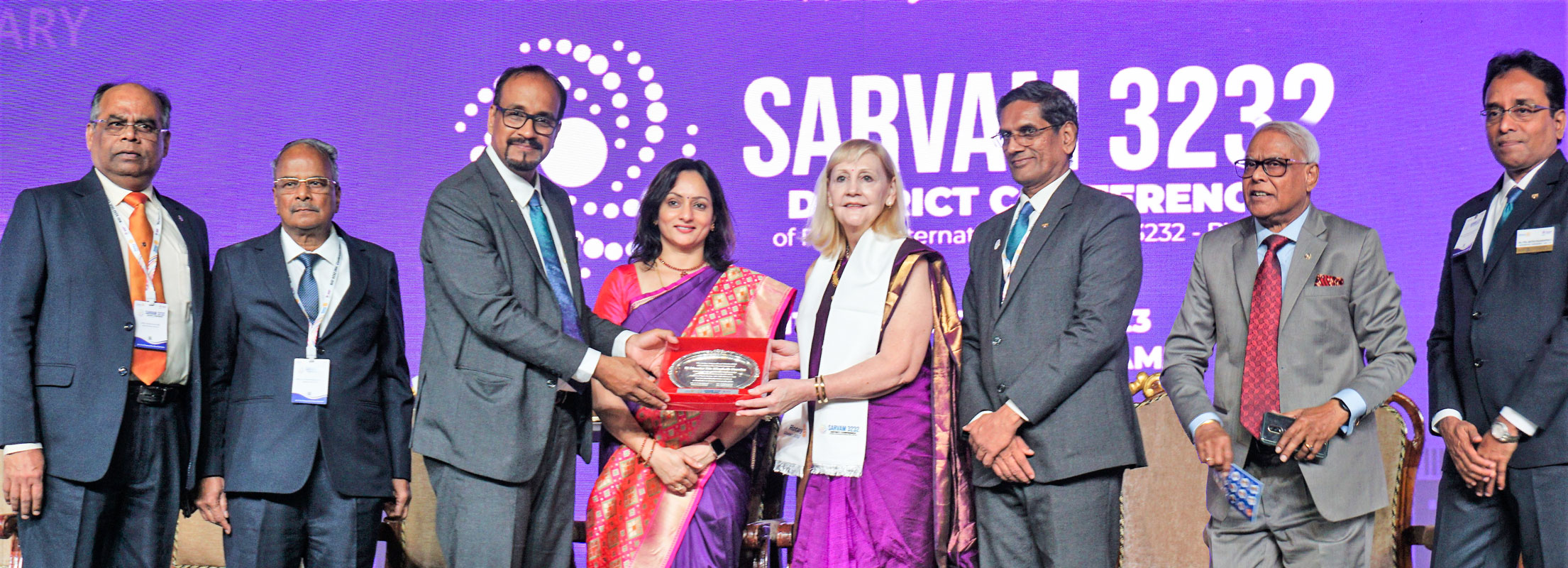
G Chandramohan, Sumedha, Discon chair M Ambalavanan, RIDE Roychowdhury and PDG S Muthupalaniappan.
Unlike other discons, Sarvam is also holding a sustainability and wellness expo, along a with Rotary project fair, which will pave the way for partnerships with the government and other stakeholders, said DG N Nandakumar. “We will partner with The Art of Living Foundation having a large volunteer base for doing a number of projects across the focus areas of Rotary and avenues of service,” he said. “Leadership is a continuous process and as district governor I will proactively engage with all the Rotarians in the district,” he said. On March 19, a Sufi music concert by composer A R Rahman will be conducted as a fundraiser by RID 3232, he said.
Earlier, The Art of Living founder Ravi Shankar, after inaugurating the discon said, “service is the highest expression of human nature. If only people in the world are engaged in some form of service or other useful activities, there will be much less violence and conflict in the world.” Pointing out the growing cases of depression and anxiety in our world, he said, as human beings we should not allow others to take their lives. “There are stress and tensions in our societies. But we have to strive for a violence-free world, disease-free body and confusion-free mind.”
Of late, GoI has started to give importance to mental health. In the US already, there are 108 universities offering courses on mental wellness, while the American Congress pays for its government staff and workers to attend workshop on meditation, Ravi Shankar said.
Expressing his happiness over the MoU with RID 3232 for joint projects in combatting depression and anxiety, he said Rotary clubs must join “our volunteers in river restoration projects.” He cited the work of AoL volunteers who had rejuvenated Naganadhi river that flows from Tiruvannamalai through Vellore and merges into the Palar river in Kancheepuram. It had completely dried up over 20 years ago, “but two years ago, we made it a flowing river all through the year with the cooperation of the people.”
At a panel discussion, moderated by PDG R Ganapathi, on CSR grants for Rotary projects, industry honchos urged the NGOs to connect with the trade chambers. Calling for Rotary and industry to work together, the panellists — Kamal Bali, MD, Volvo India; P Pradeep Kumar, chairman, Karnataka Bank; M Murali, MD Shriram Properties; and V Nagappan, president, Hindustan Chamber of Commerce — noted that there was an unused CSR amount of ₹25,000 crore last year alone and “this was mainly due to the lack of ‘connect bandwidth’ between industry and the NGOs.” Hence, there is a need for constant networking, they said.
Sustainability, wellness
Rotary clubs must join hands with the district forest officers (DFOs) in the 38 revenue districts of Tamil Nadu to grow nurseries and native saplings to help the state achieve its Green TN Mission of increasing its green cover from 23.7 per cent to the national average of 33 per cent in the next 10 years, said Supriya Sahu, additional chief secretary, environment, Tamil Nadu government. “In the first year, we have already planted 2.8 crore trees across the state.”
Addressing the Sarvam Expo on health, wellness and sustainability, she recalled that Tamil Nadu was the “first state to conduct a mega sustainability expo with the support of TN Pollution Control Board in September last year.” That exhibition had over 200 stalls promoting eco-friendly products. “TN was also the first in the country to ban 14 types of plastics in 2018, and this was followed by other states after a few years,” she said.
TN Wetland and Climate Change Missions have goals to restore around 100 wetlands in five years and increase the installed renewable, green energy from 51 per cent, the highest in the country, to over 60 per cent capacity in the next few years. “Our state is the leader in the generation of solar and wind energy. If forests are our lungs, then wetlands are our kidneys as they filter out the pollutants and restore the environment by fixing the carbon,” explained Sahu. After the restoration of the Pallikaranai marsh in Chennai by creating an eco-park that has a walkers’ track, “around 15,000 people including elders and disabled visit it each month for fresh air,” she said.
Following the success story of Odanthurai village in Coimbatore after the then panchayat president R Shanmugam had set up a community windmill to generate power for the houses, the TN government has adopted 10 villages to make them ‘climate smart’. The village now sells the surplus power to the state grid and has plans to generate solar power too. “At the model villages, we will have water treated and recycled, no plastic will be used, children will be educated on eco-friendly life, and only green energy will be used,” Sahu added.
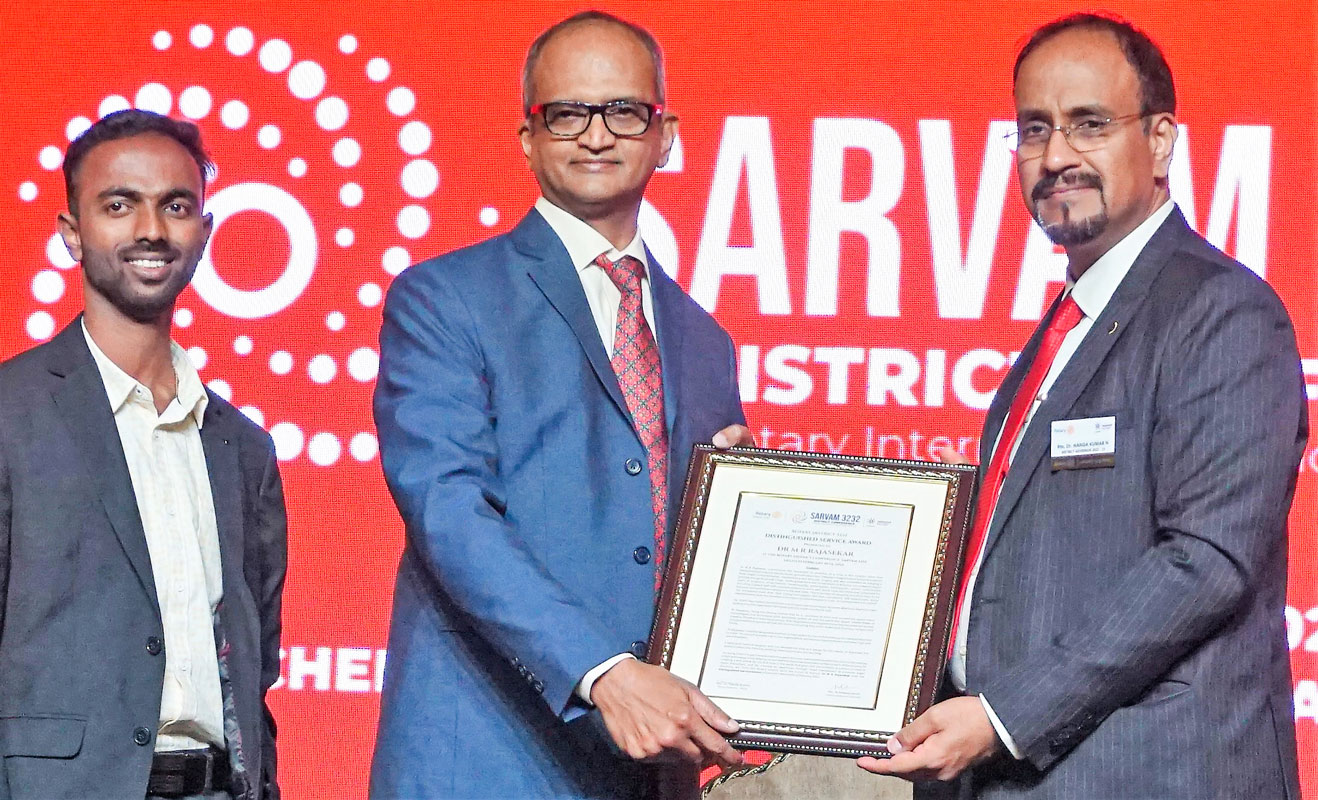
Discon chair M Ambalavanan said for the first time a Rotary fair was open to the public. “Sarvam Expo is my dream come true as I wanted to hold it along with the discon. But only eight clubs are showcasing their projects. From next year, we want at least 100 clubs to put up their stalls,” he said. DG Nandakumar urged Rotarians to spread the message of sustainability to change the mindset of the people.
Krishnan Sadagopan, senior vice-president, Ashok Leyland, stressed the need to decarbonise India’s power grid by diversifying into clean, green renewables such as solar, wind and ethanol mix. As the Earth gets warmer due to climate change, its harmful impacts will be felt in the communities. “We need many innovations such as green hydrogen engine and biofuel for ease of living, access to non-fossil energy which the GoI has understood as it is taking up a number of initiatives,” he added. Sarvam Expo chair Jaishankar Unnithan welcomed the participants.
Discon awards
Receiving the Distinguished Service Award for the first successful liver transplant in India and other critical, high-risk surgeries, Dr M R Rajasekar, a transplant surgeon, said, “I am really honoured to receive the Rotary award, in fact the first public recognition for the liver transplant I have done.” He recalled the contribution of his wife Dr Vasudha, a Rotarian, and the support of his son, as well as “my teachers who have shared their knowledge with me.”
The award citation said he has done over 2,000 kidney and over 650 liver transplants and 700-plus laparoscopic surgeries. He set up India’s first liver transplant unit and an ICU in Delhi, on the lines of those in the University of Chicago, where he was trained.
As a 20-month-old, sick child Sanjay Kandasamy got a rebirth in 1998 with a successful liver transplant by Dr Rajasekar, at the Indraprastha Apollo Hospitals, Delhi. Now, after a gap of 25 years, the transplantee who has become a doctor, shared the Rotary podium with Dr Rajasekar as both were felicitated.
Rotary’s Lifetime Achievement Awards were presented to playback singer K S Chitra and AP MedTech Zone CEO Jitendra Sharma. Film producer and actress Suhasini Maniratnam presented the Significant Achievement Award to Feedback Foundation CEO Ajay Sinha for working towards sustainable social change with over 50 professionals to meet global development objectives.
Pictures by V Muthukumaran






